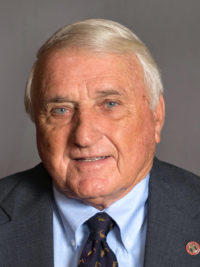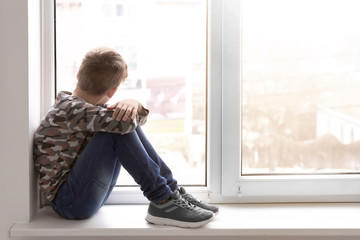
Caption
The commission’s report describes a “vast unmet children’s mental health services need” in Georgia.
Credit: Stock photo
|Updated: May 15, 2021 5:24 PM

The commission’s report describes a “vast unmet children’s mental health services need” in Georgia.
Last year, as Georgia endured the strain of COVID-19, a blue-ribbon commission quietly held regular meetings about how to improve mental health services in the state.
The panel issued its report in January, just as the state Legislature convened in Atlanta for its annual session. The experts had spent over a year developing more than 50 recommended changes to the state’s laws, policies and budgetary priorities that they believed would improve the mental health of Georgians.
Among the members of the Georgia Behavioral Health Reform and Innovation Commission are former state Rep. Kevin Tanner, a Dawsonville Republican whose previous legislative proposal powered the panel’s formation; Dr. Brenda Fitzgerald, who’s both a former Public Health commissioner of Georgia and a former CDC director; former GOP state Sen. Renee Unterman, who’s a nurse by profession; and current Rep. Mary Margaret Oliver (D-Decatur).
Yet nothing came of the panel’s recommendations. Legislators finished their session at the end of March and went home without taking action on the mental health proposals.
Members of the commission have been left speculating why the year of meetings and the extensive report went nowhere.
“The mental health system in Georgia is abysmal,” said Dr. Eric Lewkowiez, a child psychiatrist and Augusta University professor who’s a member of the commission. “More people can’t get care than can.”
The commission’s report describes a “vast unmet children’s mental health services need” in Georgia. Another central finding is that the state should make sure that mental health is treated on a par with physical health, as required by federal law, says the report.
Other proposals aim to bolster access to services at the community level and to prevent use of the criminal justice system to deal with people whose real problem is mental illness.
“A jail is not a mental health facility,” state Rep. Don Hogan (R-St. Simons Island), a member of the commission, told GHN last week. “It’s just not right for those people to be in jails.”

State Rep. Don Hogan (R-St. Simons Island) is a member of the commission.
And the state should increase pay for mental health services and streamline drug lists to apply to all Medicaid insurers, the report said.
But members of the mental health commission speculate that the drive to pass election reform stole attention away from the report’s recommendations. COVID-19 may have also hampered efforts to get legislation jump-started.
Because of COVID, almost all the commission’s work last year was conducted through virtual meetings. And one member, state Sen. Donzella James (D-Atlanta), was confined to a hospital bed for much of the session due to COVID.
But there were also “competing interests,” as Dr. Fitzgerald put it.
“We all saw election reform took over last year,” said Kim Jones, executive director of the Georgia chapter of the National Alliance for the Mentally Ill (NAMI), who’s a member of the commission.
A spokesman for Gov. Brian Kemp did not respond to GHN’s emails requesting comment.
Meanwhile, there is a huge need for mental health providers in Georgia, the report says. All but nine of Georgia’s 159 counties have shortages in some parts of their mental health workforces. Georgia is 51st in terms of access to mental health, according to 2021 state rankings released by Mental Health America.
During the recent General Assembly session, lawmakers clearly didn’t ignore mental health.
The budget for the upcoming fiscal year (which begins July 1) includes increased funding for many services, following a year of cuts to programs and positions. It includes $2 million for school mental health services through the Apex program.
The new budget also includes an injection of $90 million from the federal COVID relief bill, although it is unclear how that will be spent.
The commission’s report covers the full spectrum of Georgians’ mental health needs, ranging from elementary school mental health to treatment for mentally ill prisoners.
“It can take years to build out the state’s mental health system and bolster the mental health clinician workforce, but Georgia’s children cannot wait that long,” said a special subcommittee focused on child and adolescent care.
The state should increase funding for school- and community-based mental health services for kids, the report said.
And state reimbursement policies should pay for the time it takes when primary care providers and specialists consult about the best way to provide care for children. This would let primary providers get the the help of specialists for the children they serve.

From a medical perspective, it’s better to keep children at home when possible. But community resources in Georgia usually do not allow for that.
Georgia does not necessarily need to build more facilities or create more “beds” – or spaces for mentally ill children, Fitzgerald said. She chaired a subcommittee on health facilities in the state.
Rather, the state should use its current resources more effectively, Fitzgerald told GHN last week.
If outpatient or community-based care could be improved, inpatient beds could go to those children who need more in-depth care, said Fitzgerald.
Child psychiatrist Lewkowiez said he often sees children in inpatient facilities who are there not because their condition truly requires it, but because they cannot not get consistent care in their communities.
From a medical perspective, it’s better to keep children at home when possible. But community resources in Georgia usually do not allow for that, he said.
He noted that outside Atlanta, there are very few intensive outpatient treatment programs that let children continue to live at home while getting the care they need during the day.
That’s reflected in data from Children’s Healthcare of Atlanta. As many as 1 in 8 patients who are referred from CHOA’s emergency rooms to inpatient psychiatric treatment facilities are seen back at CHOA within thirty days.
That means that children are not able to stay at inpatient care facilities as long as they need, or that they are not able to regularly access care at home once they are discharged.
Cutting down on these needless readmissions would benefit everyone — patients, parents and providers — and would save money, Fitzgerald said.
The state should create a uniform drug list applying to all Medicaid insurers for at least some widely used drugs, said the report. Doing so would make providers’ and patients’ lives easier, said Lewkowiez, who recommended the change.
Differing drug lists result in major problems for providers, he said. What’s worse, children often lose access to drugs that they need if there’s a change in insurers. He’s not sure why that happens – but it does, he says.
It creates a tough situation: A child has been stabilized and then loses access to the drug he or she just got used to.
When that happens, kids can face trouble in school, suspension, and many other problems. “It really puts a strain on patients,” he said. “These are kids that are already struggling day to day.”
Creating a uniform formulary “seems like a way to make people’s lives a lot easier,” he said.
And it would save Georgia money, as seen in states that have done something similar, the report says.
Problems getting access to care often lead Georgians who battle mental illness to get caught up in the criminal justice system instead of getting treatment in the community.
“It’s really a sad commentary about how we treat people with mental illness,” said LaGrange Chief of Police Louis Dekmar, a commission member.
In a controversial proposal, the report recommended a change in state law to make it easier for those around a mentally ill person to commit that person for treatment.
And Georgia should set up pilot “Assisted Outpatient Treatment” (AOT) programs, said the subcommittee chaired by Superior Court Judge Brian Amero.
People who have significant mental health needs but pose a low risk for criminal activity should be treated on the civil and not the criminal side of the justice system, said Judge Amero.
Currently, criminal courts can order treatment as an alternative to jail. And on the civil side, probate judges can order involuntary treatment in certain circumstances. But that system needs bolstering, the report said.
The proposed assisted outpatient treatment system would set up collaborations between a local treatment system and the courts that would ensure outpatient orders are “taken seriously.”
In AOT programs, the judge, a mental health treatment team and others work together closely to ensure the patients get the treatment they need. According to the report, this program would “leverage the power of a court order to motivate participants to stay engaged in treatment.” AOT provides people with mental illness with the “services of a mental health court without the need to criminalize” them.
Amero touted the power of “being accountable to people who care about you.”
Slowing the flow “of sick people into local jails” is one of the highest priorities of the commission, said Amero. This is an issue in “desperate need of some attention and investment.”
The proposals are “much more humane in their approach than ones previously employed,” said Amero.
Another member of the subcommittee — longtime Georgia mental health advocate Nora Lott Haynes — said her personal experience in caring for a mentally ill adult child showed her the need for changes.
She said her adult child had been part of court-ordered treatment programs five separate times but never received the case management support needed to stick to the plan. She said there were “no milestones and no progress meetings.” In her experience, “you get the order and a year later you’re off the order . . . [it’s] really just a waste of time.”
For “someone who cannot make decisions for themselves, it’s almost cruel to leave them to their own devices, because where do they end up? Homeless, in jail, dead.”
Lott is opposed to how the current system allows such things to occur.
“If someone thinks it’s an advantageous way to get treatment – in jail – it’s not. We will figure out ways in Georgia to have a more robust provider system, [so that] if someone does get really sick they can get some help,” said Lott.
During the legislative session, Hogan proposed a bill that would have set up the pilot projects for the assisted outpatient treatment program as recommended by the Commission. The bill’s backers “didn’t even get a committee hearing on it,” he said.
“Everything we wanted was in the bill, but it did not get out of committee,” said Haynes.
The AOT proposal has many backers, who cite evidence of its success in New York and other states.
But some in the mental health community raise concerns about patients’ rights under AOT programs.
“We understand that at times it might be helpful. We are cautious about protecting the civil rights of those with a health condition,” said NAMI’s Jones.
“We want to establish access before we force treatment,” said Jones, outlining NAMI GA’s position.
While their proposals did not change anything this year, the commissioners are hoping for a different outcome in next year’s General Assembly session.
“At the conclusion of this [2021 legislative] session, we were all hopeful that at the close of the next we would have legislative and budgetary support,’’ Amero said.
This story comes to GPB through a reporting partnership with Georgia Health News.